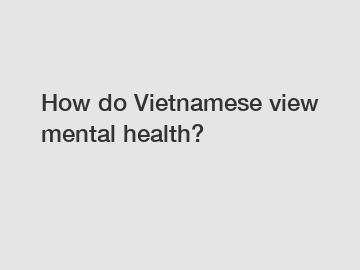How do Vietnamese view mental health?
In recent years, conversations around mental health have become more open and accepted in many societies around the world. However, in some cultures, there remains a stigma surrounding mental health issues. One such culture is that of Vietnam, where traditional beliefs and societal norms continue to shape how mental health is viewed and treated.
In Vietnam, mental health is often seen through the lens of Confucianism and the idea of maintaining harmony within the family and society. This can lead to a reluctance to discuss or seek help for mental health issues, as it may be perceived as a sign of weakness or failure to fulfill societal expectations.
In addition, mental health care in Vietnam is still in its infancy compared to Western countries, with limited access to resources and services. This lack of awareness and support can make it challenging for individuals to receive the help they need.

Despite these challenges, attitudes towards mental health in Vietnam are slowly evolving. There is a growing awareness of the importance of mental well-being, with more people recognizing the impact that mental health has on overall health and quality of life.
One positive development is the increasing availability of mental health services and support groups in Vietnam. These resources help to break down the stigma and provide individuals with a safe space to seek help and share their experiences.
However, there is still much work to be done in changing the perception of mental health in Vietnam. Education and awareness campaigns are key in promoting understanding and acceptance of mental health issues.
It is also essential for mental health professionals to receive proper training and support in order to provide effective care for those in need. By enhancing the quality of mental health services, more individuals will be able to access the help they need to improve their well-being.
As a Vietnamese-American with a background in psychology, I have a unique perspective on mental health in Vietnam. Through my work with individuals from both cultures, I have seen firsthand the challenges and opportunities in addressing mental health issues in Vietnamese society.
One of the most significant barriers to seeking help for mental health issues in Vietnam is the fear of judgment and stigma. Those who struggle with mental health concerns may feel ashamed or embarrassed to talk about their experiences, leading to isolation and suffering in silence.
To combat this stigma, it is crucial to create a supportive and understanding environment where individuals feel safe to share their struggles and seek help. By opening up conversations about mental health and promoting acceptance and empathy, we can help break down the barriers that prevent people from getting the support they need.
Another important aspect of mental health care in Vietnam is the need for culturally sensitive approaches to treatment. Traditional Vietnamese beliefs and practices may influence how individuals perceive and cope with mental health issues, making it essential for providers to take these cultural factors into consideration when working with clients.
By incorporating cultural competence into mental health services, providers can build trust and rapport with clients and create treatment plans that are effective and meaningful for each individual. This approach helps to bridge the gap between traditional beliefs and modern mental health practices, allowing for more holistic and personalized care.
In my experience, I have found that combining elements of Western psychology with traditional Vietnamese values can be a powerful tool in supporting individuals' mental health. By honoring the cultural context in which mental health is viewed, we can create a more inclusive and effective approach to care that resonates with clients on a deeper level.
In conclusion, the view of mental health in Vietnam is complex and multifaceted, shaped by cultural, societal, and historical factors. While there are still challenges to overcome, there is hope for a more accepting and supportive future for mental health in Vietnam.
Through increased awareness, education, and culturally sensitive approaches to care, we can help individuals in Vietnam access the resources and support they need to thrive mentally, emotionally, and socially. By working together to break down stigma and promote understanding, we can create a more compassionate and inclusive society for all.
For more how citicoline works, citicoline sodium benefits, Citicoline Sodium for traumatic brain injury recovery information, please contact us. We will provide professional answers.
204
0
0

Comments
All Comments (0)